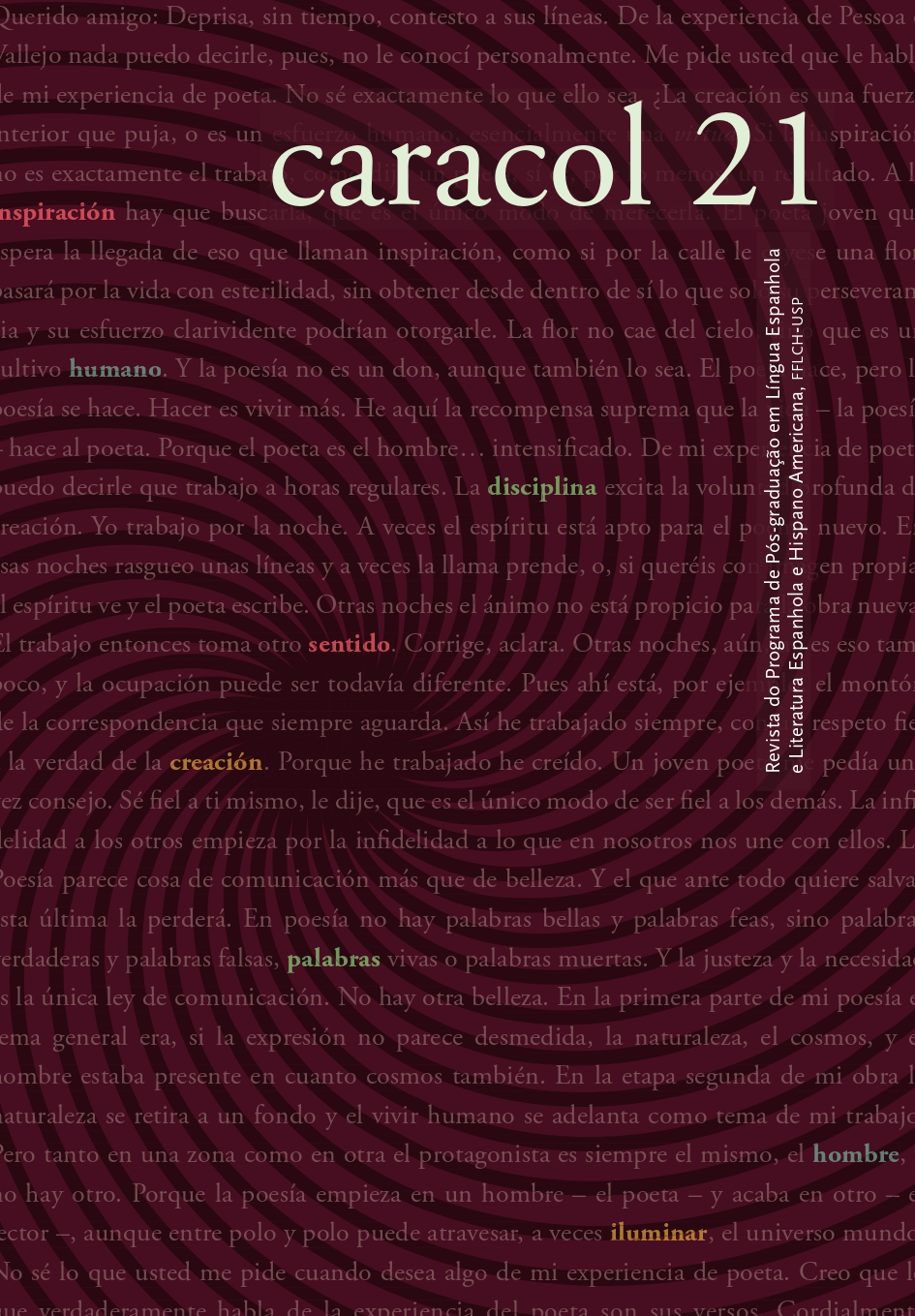Texto y textura: el principio ecfrástico en Paseo de la identidad de Luis Bagué Quílez
DOI:
https://doi.org/10.11606/issn.2317-9651.i21p196-244Palabras clave:
Luis Bagué Quílez, Paseo de la identidad, Poesía española contemporánea, Écfrasis, IntermedialidadResumen
En este trabajo se analiza el poemario Paseo de la identidad (2014) de Luis Bagué Quílez con un enfoque ecfrástico desde las teorías estadounidenses sobre la intermedialidad. Se argumentará la elección de las obras de arte, y los poemas ecfrásticos que a partir de ellas se construyen, como un tratado panorámico que aborda la identidad –y quizás el sentido de humanidad– occidental, que parece haberse perdido o vendido desde la época moderna.
Descargas
Referencias
Abril, Juan Carlos. “Reseña de Paseo de la identidad”. In: Lectura y signo, 9, 2014, 127-129.
Bagué Quílez, Luis. Telón de sombras. Madrid: Hiperión, 2002.
Bagué Quílez, Luis. Paseo de la identidad. Madrid: Visor, 2014.
Bagué Quílez, Luis. La Menina ante el espejo. Visita al museo 3.0. Madrid: Fórcola, 2016.
Bagué Quílez, Luis. Clima mediterráneo. Madrid: Visor, 2017.
Bagué Quílez, Luis. “‘Luis Bagué. Un poeta y su mar. Entrevista a cargo de Antonio Arco”. In: La Verdad, 22/10/2018. Disponible en: <https://www.laverdad.es/ababol/literatura/luis-bague-poeta-20181020214138-nt.html>. Acceso: 23 jul. 2020.
Bagué Quílez, Luis; Penalva, Joaquín Juan. Babilonia, mon amour. Murcia: Universidad de Murcia, 2005.
Baños Saldaña, José Ángel. Desautomatización y posmodernidad en la poesía española contemporánea: La tradición Grecolatina y la Biblia. Córdoba: Editorial Universidad de Córdoba, 2019.
Bosco Díaz–Urmeneta Muñoz, Juan. “El pintor del cuerpo. Notas sobre la modernidad de Gustave Courbet”. In: Romero de Solis, Diego; Bosco Díaz–Urmeneta Muñoz, Juan; López Lloret, Jorge (org.). Variaciones sobre el cuerpo. Sevilla: Universidad de Sevilla, 1999, 45-68.
Carbajosa Palmero, Natalia. “La écfrasis en la obra de Luis Javier Moreno”. In: Revista Signa, 22, 2013, 205-226.
Deleuze, Gilles. La imagen-tiempo. Estudios sobre cine II. Barcelona/Buenos Aires/México: Paidós, 1987.
Díaz de Castro, Francisco; Del Olmo Iturriarte, Almudena (orgs.). Écfrasis e imitación artística en la poesía hispánica contemporánea. Sevilla: Renacimiento, 2012.
Deleuze, Gilles. La imagen-tiempo. Estudios sobre cine II. Barcelona/Buenos Aires/México: Paidós, 1987.
Díez de Revenga, Francisco Javier. “Signos, marcas e iconos de la modernidad en la poesía rebelde e irónica de Luis Bagué”. In: Versants, 64.3, 2017, 155-123.
Dussel, Enrique. “Crítica del ‘Mito de la Modernidad’”. In: 1492. El encubrimiento del otro. Hacia el origen del “Mito de la modernidad”. La Paz: Plural Editores, 1994.
Fernández Klohe, Carmen. El imperativo ekfrástico en la prosa de Ramón Gómez de la Serna. Nueva York: Monografías de ALDEEU, 2001.
Fernández Mallo, Augustín. Teoría general de la basura (cultura, apropiación, complejidad). Barcelona: Galaxia Gutenberg, 2018.
García Martínez, Luis Francisco. La ékfrasis en la poesía contemporánea española: de Ángel González a Encarnación Pisonero. Madrid: Devenir, 2011.
Hagstrum, Jean. The sister arts. The tradition of literary pictorialism and English poetry from Dryden to Gray. Chicago: University of Chicago Press, 1958.
Heffernan, James A. W. Museum of Words. The Poetics of Ekphrasis from Homer to Ashberry. University of Chicago Press, 1993.
Jiménez Millán, Antonio. “Modernidad y síntesis de las artes”. In: Litoral. “Museum: la pintura escrita”, 258, 2014, 156-168.
Krieger, Murray. “Ekphrasis and the Still Movement of Poetry; or Lackoon Revisited”. In: McDowell, Frederick P. W. (org.). The Poet as Critic. Evanston:
Northwestern University Press, 1967, 3-26.
Krieger, Murray. Ekphrasis. The Illusion of a Natural Sign. Baltimore: Johns Hopkins UP, 1992.
Lessing, Gotthold Ephraim. Laocoonte o sobre los límites en la pintura y la poesía. México: UNAM, 1960.
Luján Atienza, Ángel Luis. “Reseña de Paseo de la identidad”. In: Paraíso: revista de poesía, 12, 2016, 169-172.
Melville, Herman. Moby Dick. Madrid: Círculo de Lectores, 1994.
Mignolo, Walter. “Aiesthesis decolonial”. In: Calle 14. Revista de investigación en el campo del arte, 4.4, 2010, 10-25.
Mitchell, William John Thomas. Iconología. Imagen, texto, ideología. Buenos Aires: Capital Intelectual, 2016.
Mitchell, William John Thomas. ¿Qué quieren las imágenes? Una crítica de la cultura visual. Vitoria-Gasteiz: Sans Soleil, 2017.
Montiel, Juan Antonio. “Prólogo”. In: Strand, Mark. Hopper. Barcelona: Lumen, 2008 [2004], 6-10.
Moretti, Franco. “The dialectic of fear”. In: New Left Review, 136, 1982, 67-85.
Pérez Bergliaffa, Mercedes. “El último amor de Antonio Berni”. In: Clarín. Cultura, 10/07/2010. Disponible en: <https://www.clarin.com/cultura/76-30-bernicreo-ultimo-amor_0_rJo0lq-BW.html>. Acceso: 22 jul. 2020.
Publio Virgilio Marone, Eneida. Edición y traducción de Alfonso Cuatrecasas. Madrid: Austral, 2012.
Riffaterre, Michael. “La ilusión de la écfrasis”. In: Monegal, Antonio (org.). Literatura y pintura. Madrid: Arco Libros, 2000, 161-183.
Rodríguez Herrera, José Manuel. “El capitán Ahab frente al enigma del abismo: el valor de los símbolos en Moby Dick”. In: Amerika, 11, 2014. Disponible en: <https://journals.openedition.org/amerika/5620?lang=en>. Acceso: 23 jul. 2020.
Rushton, Richard. “Passions and actions: Deleuze’s cinematographic Cogito”. In: Deleuze Studies, 2.2, 2008, 121-139.
Shannon, Joshua. The recording machine: art and fact during the cold war. New Haven/Londres: Yale University Press, 2017.
Strand, Mark. “Edward Hopper”. In: Encyclopaedia Britannica. Disponible en: <https://www.britannica.com/biography/Edward-Hopper>. Acceso: 22 jul. 2020.
Strand, Mark. Hopper. Barcelona: Lumen, 2008.
Publicado
Número
Sección
Licencia
Derechos de autor 2021 Giuliana Calabrese

Esta obra está bajo una licencia internacional Creative Commons Atribución-NoComercial 4.0.
Los autores que publican en esta revista están de acuerdo con los siguientes términos:
- Los autores conservan los derechos de autor y otorgan a la revista el derecho a la primera publicación, con el trabajo simultáneamente licenciado bajo una Licencia Creative Commons Attribution que permite a otros compartir el trabajo con el reconocimiento de la autoría y la publicación inicial en esta revista.
- Los autores pueden establecer por separado acuerdos adicionales para la distribución no-exclusiva de la versión del trabajo publicada en esta revista (ej.: publicarlo en un repositorio institucional o como un capítulo de libro), con el reconocimiento de la autoría y la publicación inicial en esta revista.
- Se permite y se anima a los autores a publicar y difundir su trabajo en línea (ej.: en repositorios institucionales o en su página personal) en cualquier punto, antes o durante el proceso editorial, ya que eso puede generar alteraciones productivas, así como aumentar el impacto y las citaciones del trabajo publicado (Véase El Efecto del Acceso Libre).




